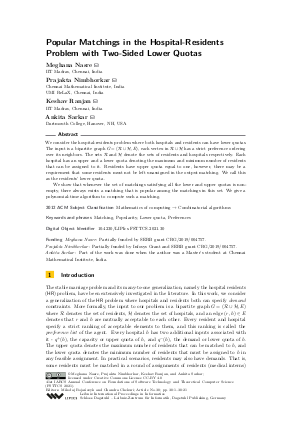Popular Matchings in the Hospital-Residents Problem with Two-Sided Lower Quotas
Authors Meghana Nasre, Prajakta Nimbhorkar, Keshav Ranjan, Ankita Sarkar
-
Part of:
Volume:
41st IARCS Annual Conference on Foundations of Software Technology and Theoretical Computer Science (FSTTCS 2021)
Part of: Series: Leibniz International Proceedings in Informatics (LIPIcs)
Part of: Conference: IARCS Annual Conference on Foundations of Software Technology and Theoretical Computer Science (FSTTCS) - License:
 Creative Commons Attribution 4.0 International license
Creative Commons Attribution 4.0 International license
- Publication Date: 2021-11-29
File

PDF
LIPIcs.FSTTCS.2021.30.pdf
- Filesize: 0.77 MB
- 21 pages
Document Identifiers
Subject Classification
ACM Subject Classification
- Mathematics of computing → Combinatorial algorithms
Keywords
- Matching
- Popularity
- Lower quota
- Preferences
Metrics
- Access Statistics
-
Total Accesses (updated on a weekly basis)
0Document
0Metadata
Abstract
We consider the hospital-residents problem where both hospitals and residents can have lower quotas. The input is a bipartite graph G = (ℛ∪ℋ,E), each vertex in ℛ∪ℋ has a strict preference ordering over its neighbors. The sets ℛ and ℋ denote the sets of residents and hospitals respectively. Each hospital has an upper and a lower quota denoting the maximum and minimum number of residents that can be assigned to it. Residents have upper quota equal to one, however, there may be a requirement that some residents must not be left unassigned in the output matching. We call this as the residents' lower quota. We show that whenever the set of matchings satisfying all the lower and upper quotas is non-empty, there always exists a matching that is popular among the matchings in this set. We give a polynomial-time algorithm to compute such a matching.
Cite As Get BibTex
Meghana Nasre, Prajakta Nimbhorkar, Keshav Ranjan, and Ankita Sarkar. Popular Matchings in the Hospital-Residents Problem with Two-Sided Lower Quotas. In 41st IARCS Annual Conference on Foundations of Software Technology and Theoretical Computer Science (FSTTCS 2021). Leibniz International Proceedings in Informatics (LIPIcs), Volume 213, pp. 30:1-30:21, Schloss Dagstuhl – Leibniz-Zentrum für Informatik (2021)
https://doi.org/10.4230/LIPIcs.FSTTCS.2021.30
BibTex
@InProceedings{nasre_et_al:LIPIcs.FSTTCS.2021.30,
author = {Nasre, Meghana and Nimbhorkar, Prajakta and Ranjan, Keshav and Sarkar, Ankita},
title = {{Popular Matchings in the Hospital-Residents Problem with Two-Sided Lower Quotas}},
booktitle = {41st IARCS Annual Conference on Foundations of Software Technology and Theoretical Computer Science (FSTTCS 2021)},
pages = {30:1--30:21},
series = {Leibniz International Proceedings in Informatics (LIPIcs)},
ISBN = {978-3-95977-215-0},
ISSN = {1868-8969},
year = {2021},
volume = {213},
editor = {Boja\'{n}czyk, Miko{\l}aj and Chekuri, Chandra},
publisher = {Schloss Dagstuhl -- Leibniz-Zentrum f{\"u}r Informatik},
address = {Dagstuhl, Germany},
URL = {https://drops.dagstuhl.de/entities/document/10.4230/LIPIcs.FSTTCS.2021.30},
URN = {urn:nbn:de:0030-drops-155419},
doi = {10.4230/LIPIcs.FSTTCS.2021.30},
annote = {Keywords: Matching, Popularity, Lower quota, Preferences}
}
Author Details
Funding
- Nasre, Meghana: Partially funded by SERB grant CRG/2019/004757.
- Nimbhorkar, Prajakta: Partially funded by Infosys Grant and SERB grant CRG/2019/004757.
- Sarkar, Ankita: Part of the work was done when the author was a Master’s student at Chennai Mathematical Institute, India.
References
-
David J Abraham, Robert W Irving, Telikepalli Kavitha, and Kurt Mehlhorn. Popular matchings. SIAM Journal on Computing, 37(4):1030-1045, 2007.

-
Péter Biró, Robert W Irving, and David F Manlove. Popular matchings in the marriage and roommates problems. In International Conference on Algorithms and Complexity, pages 97-108. Springer, 2010.

-
Florian Brandl and Telikepalli Kavitha. Two problems in max-size popular matchings. Algorithmica, 81(7):2738-2764, 2019.

-
Ágnes Cseh and Telikepalli Kavitha. Popular edges and dominant matchings. Mathematical Programming, 172(1):209-229, 2018.

-
Yuri Faenza and Telikepalli Kavitha. Quasi-popular matchings, optimality, and extended formulations. In Proceedings of the Fourteenth Annual ACM-SIAM Symposium on Discrete Algorithms, pages 325-344. SIAM, 2020.

- Tamás Fleiner and Naoyuki Kamiyama. A matroid approach to stable matchings with lower quotas. Math. Oper. Res., 41(2):734-744, 2016. URL: https://doi.org/10.1287/moor.2015.0751.
-
Peter Gärdenfors. Match making: assignments based on bilateral preferences. Behavioral Science, 20(3):166-173, 1975.

-
Mizuki Hirakawa, Yukiko Yamauchi, Shuji Kijima, and Masafumi Yamashita. On the structure of popular matchings in the stable marriage problem-who can join a popular matching. In the 3rd International Workshop on Matching under Preferences (MATCH-UP), 2015.

- Chien-Chung Huang. Classified stable matching. In Proceedings of the Twenty-First Annual ACM-SIAM Symposium on Discrete Algorithms, SODA 2010, pages 1235-1253, 2010. URL: https://doi.org/10.1137/1.9781611973075.99.
-
Chien-Chung Huang and Telikepalli Kavitha. Popular matchings in the stable marriage problem. Information and Computation, 222:180-194, 2013.

-
Chien-Chung Huang and Telikepalli Kavitha. Popularity, mixed matchings, and self-duality. Mathematics of Operations Research, 2021.

-
Telikepalli Kavitha. A size-popularity tradeoff in the stable marriage problem. SIAM Journal on Computing, 43(1):52-71, 2014.

-
Telikepalli Kavitha. Popular half-integral matchings. In 43rd International Colloquium on Automata, Languages, and Programming (ICALP 2016). Schloss Dagstuhl-Leibniz-Zentrum fuer Informatik, 2016.

-
Telikepalli Kavitha. Popular matchings with one-sided bias. In 47th International Colloquium on Automata, Languages, and Programming (ICALP 2020). Schloss Dagstuhl-Leibniz-Zentrum für Informatik, 2020.

-
Telikepalli Kavitha. Matchings, critical nodes, and popular solutions. In 41st IARCS Annual Conference on Foundations of Software Technology and Theoretical Computer Science, FSTTCS 2021 (To Appear), 2021.

- Telikepalli Kavitha. Maximum Matchings and Popularity. In 48th International Colloquium on Automata, Languages, and Programming (ICALP 2021), volume 198, pages 85:1-85:21, 2021. URL: https://doi.org/10.4230/LIPIcs.ICALP.2021.85.
-
Zoltán Király. Better and simpler approximation algorithms for the stable marriage problem. Algorithmica, 60(1):3-20, 2011.

- A. M. Krishnapriya, Meghana Nasre, Prajakta Nimbhorkar, and Amit Rawat. How good are popular matchings? In 17th International Symposium on Experimental Algorithms, SEA 2018, pages 9:1-9:14, 2018. URL: https://doi.org/10.4230/LIPIcs.SEA.2018.9.
-
Matthias Mnich and Ildikó Schlotter. Stable matchings with covering constraints: A complete computational trichotomy. Algorithmica, 82(5):1136-1188, 2020.

- Meghana Nasre and Prajakta Nimbhorkar. Popular matchings with lower quotas. In 37th IARCS Annual Conference on Foundations of Software Technology and Theoretical Computer Science, FSTTCS 2017, pages 44:1-44:15, 2017. URL: https://doi.org/10.4230/LIPIcs.FSTTCS.2017.44.
-
Meghana Nasre and Amit Rawat. Popularity in the generalized hospital residents setting. In International Computer Science Symposium in Russia, pages 245-259. Springer, 2017.

